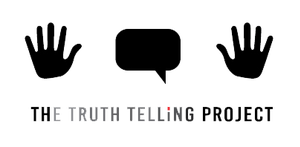Difference between revisions of "Truth Telling Project"
| Line 10: | Line 10: | ||
According to their website, the [[Truth Telling Project]] "implements and sustains grassroots, community-centered truth-telling processes to share local voices, to educate America, and to support reconciliation for the purposes of eliminating structural violence and systemic racism against Black people in the United States."<ref>[http://thetruthtellingproject.org/ The Truth Telling Project Homepage, accessed April 24 2017]</ref> | According to their website, the [[Truth Telling Project]] "implements and sustains grassroots, community-centered truth-telling processes to share local voices, to educate America, and to support reconciliation for the purposes of eliminating structural violence and systemic racism against Black people in the United States."<ref>[http://thetruthtellingproject.org/ The Truth Telling Project Homepage, accessed April 24 2017]</ref> | ||
| + | |||
| + | ==Founding of the Truth Telling Project== | ||
| + | |||
| + | In October 2015, an article at TheHoya addressed the founding of the [[Truth Telling Project]], | ||
| + | |||
| + | ::"...Co-Directors [[Cori Bush]] and [[David Ragland]] spoke about their experiences on the frontlines of the police brutality protests in Ferguson, Mo. Friday morning in the [[Healey Family Student Center]]. | ||
| + | |||
| + | ::According to both Bush and Ragland, their participation in the movement came at a personal price. Bush said that she has received violent threats, such as death threats from the Ku Klux Klan, but she said that she refuses to back down in the face of adversity. | ||
| + | |||
| + | ::“We keep protesting because they keep killing us,” Bush said. “It’s not OK that I have to fight to be free the way a white woman is free. What makes my son different that I have to fight for him to be able to walk out of my home and walk to the corner store and come back safely? Why do I have to fear? That is a reality in my community every day. My son may not come home.”<ref>[http://www.thehoya.com/dialogue-project-founders-tackle-police-brutality/ Dialogue Project Founders Tackle Police Brutality, accessed April 24 2017]</ref> | ||
| + | |||
| + | ::"Ragland called on members of the audience to join the resistance against police brutality. | ||
| + | |||
| + | ::"Police violence is contingent upon what America approves, and my hope is that the rest of America will begin to understand what happens in some communities and withdraw their consent so that democracy is possible, because police violence wouldn’t happen if white America said we don’t want it to happen,” Ragland said." | ||
==References== | ==References== | ||
Revision as of 12:17, 24 April 2017
The Truth Telling Project was started by David Ragland in November 2014 in the wake of the Ferguson riots. It was "inspired by the Truth and Reconciliation Commission of South Africa," which was headed by Archbishop Desmond Tutu.[1] [2]
The Truth Telling Project is a not-for-profit organization under the sponsorship of the NEIU Foundation.
Mission
According to their website, the Truth Telling Project "implements and sustains grassroots, community-centered truth-telling processes to share local voices, to educate America, and to support reconciliation for the purposes of eliminating structural violence and systemic racism against Black people in the United States."[3]
Founding of the Truth Telling Project
In October 2015, an article at TheHoya addressed the founding of the Truth Telling Project,
- "...Co-Directors Cori Bush and David Ragland spoke about their experiences on the frontlines of the police brutality protests in Ferguson, Mo. Friday morning in the Healey Family Student Center.
- According to both Bush and Ragland, their participation in the movement came at a personal price. Bush said that she has received violent threats, such as death threats from the Ku Klux Klan, but she said that she refuses to back down in the face of adversity.
- “We keep protesting because they keep killing us,” Bush said. “It’s not OK that I have to fight to be free the way a white woman is free. What makes my son different that I have to fight for him to be able to walk out of my home and walk to the corner store and come back safely? Why do I have to fear? That is a reality in my community every day. My son may not come home.”[4]
- "Ragland called on members of the audience to join the resistance against police brutality.
- "Police violence is contingent upon what America approves, and my hope is that the rest of America will begin to understand what happens in some communities and withdraw their consent so that democracy is possible, because police violence wouldn’t happen if white America said we don’t want it to happen,” Ragland said."
